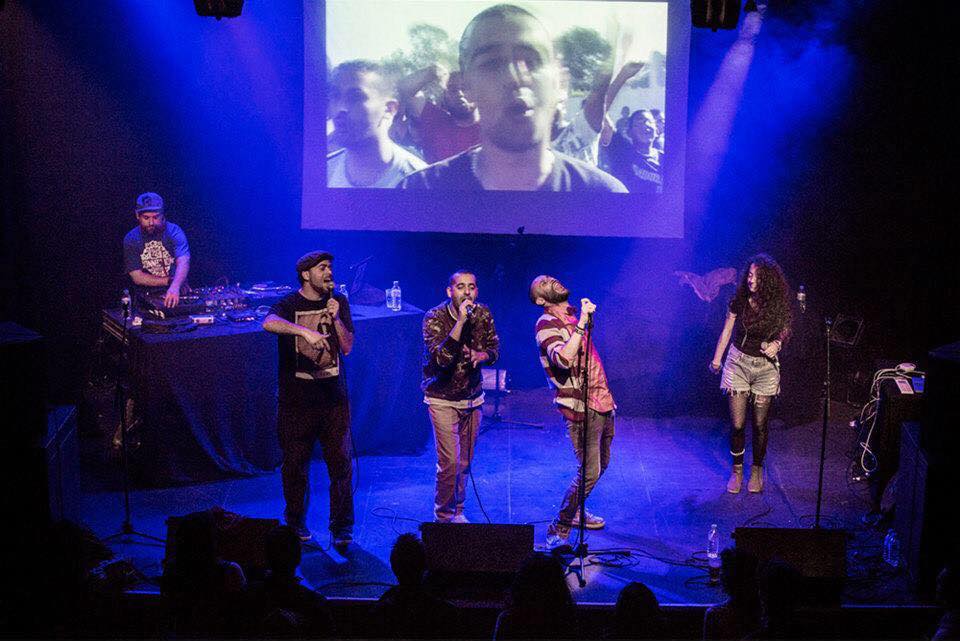Thriving Palestinian hip hop scene is a movement of art and humanity
Arab-Israeli hip hop group DAM took the Arabic hip hop scene by storm in the 2000s with the two albums and more than hundred singles they released; today the members of the group continue to sing about the struggles of the Arab-Israeli and Palestinian communities; Sameh Zakout another Arab-Israeli artist promotes peace and dialogue.
Rami Younis, an Israeli-Arab activist, blogger, and screenwriter, can barely contain his enthusiasm when speaking of the local hip hop scene, not only because while hip hop has long been in decline in its native land, becoming almost passé, in the Levant it is booming.
Booming in the right way. As in blossoming.
“It’s the most developed scene here and the biggest scene. In Palestinian Territories, it’s not in a renaissance, it’s never been dying. It’s a growing scene. Here, protest art of all types will not die as long as there is discrimination and oppression and as long as the occupation exists,” he said, speaking with The Media Line.
The granddaddy of Arabic-language hip hop in this region is DAM, a group formed by the brothers Tamer and Suhell Nafar and their friend Mahmoud Jreri, which burst onto the music scene in the mixed Jewish-Muslim Israeli city of Lod in 1999.
DAM, a full-fledged hybrid which raps in Arabic, Hebrew and English, has released over 100 singles and two albums. While their music is considered a vehicle of protest, their message is sophisticated and free and lacks—absolutely—the misogyny and ferocity of classic American hip hop. Their songs are as much about the Israeli military presence in the West Bank and anti-Arab racism as they are about the oppression of women in Arab society, and the financial corruption that crushes people wherever they may be.
They are all grown up now. Tamer Nafar is in New York putting the finishing touches on the soundtrack for a feature movie on Palestinian hip hop, due to be released next February. He says he hopes it will be their boldest step so far towards gaining a wider Western audience.
Mahmood Jreri is releasing his first solo album, The Rhythm of the Tribe, in two weeks. It is an Arabic-only production.
“When we started DAM in 1999, I did a bit in Hebrew and Tamer also did some in English, but basically since 2006 I’ve been singing only in Arabic,” Jreri explained to The Media Line. “This is for many reasons. My Arabic is stronger and I can express myself better in it, but also, in Hebrew I didn’t feel that there is a Hebrew-language public who wants to hear what we say. They always put us on the news, but we are always presented in a political rather than in a musical framework, so I just do Arabic—I feel there is more demand for hip hop in Arabic.”
“Haifa, Tel Aviv, Jerusalem, Ramallah, Jenin, Jordan and Egypt and even in the United States, everyone who speaks Arabic who comes from the Levant is a potential audience for us.”
Both Nafar and Jreri express deep frustration with the media, local and international, that appears to be more interested in the politics surrounding DAM and the unique and successful niche inhabited by the local hip hop scene than in the music itself.
“There is no Palestinian gangsta rap,” Younis says. “This is true also for the music coming out of Ramallah and Gaza. Yes, we talk about the occupation and in a way everything we do will be political because it’s a reflection of our daily lives, but for us art is a sort of escapism, so we do not feel the need to go on about violence.”
Younis points out a distinguishing feature, that women-hating texts do not feature in Palestinian-Israeli rap. “Who are the people here doing rap?” he asks. “They are all secular and progressive, opposed to the oppression of women which is a feature of our Arabic society.”
But, he adds, “even if you don’t want to sing about bitches and hoes, there are very clear lines between us and the African-American experience.”
Younis, Jreri and the Nafar brothers are from Lod, a gritty town in the vicinity of Tel Aviv. Sameh Zakout, aka SAZ, another rapper on the burgeoning Arab-Israeli scene who was highlighted in last week’s Forbes Under 30 Forum in Jerusalem - the first held outside of the United States - comes from a similar mixed urban environment. His hometown of Ramle is located just 2.5 miles from Lod.
SAZ also highlighted the West Bank and Gaza as hip hop meccas. “Tupac and Biggie are famous in Palestine,” he told a cosmopolitan, international audience at the Israel Museum where the Forbes Under 30 Forum was being held. “Half the people don’t understand English, but they understand the energy and vibes.”
In what may appear a paradoxical stance, SAZ is a pro-peace hip hop musical activist, promoting dialogue and peace alongside the American artist Matisyahu, a Jew, and the Israeli hip hop sensation Shaanan Street. “We’re not brothers,” he said in a cheerful aside to The Media Line, “But we’re from the same mother.”
On one of the Forum’s panels, SAZ recalled having been caught up in numerous altercations with Israeli police as a youth.
“When I heard (American hip hop group) NWA say ‘F*ck the police,’ I said, ‘That’s me,’” he explained. “I felt more in common with African Americans than Israelis who live two blocks away from me … for me, hip hop takes this rage and puts a positive spin on it. It changes my life.”
Article written by Noga Tarnopolsky.
Reprinted with the permission of The Media Line.











